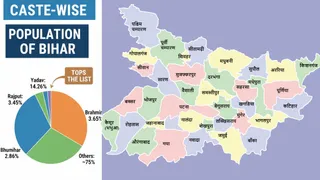- By Aditi Priya Singh
- Thu, 06 Nov 2025 01:59 PM (IST)
- Source:JND
Bihar Only Muslim Chief Minister: As Bihar prepares for the 2025 Assembly Elections, Political debates have once again focused on the leaders who have influenced the political identity of the state. The first phase of the 2025 Bihar election began today, November 6, and the second phase will take place on November 11. Bihar has seen several noteworthy chief ministers since gaining independence- from Shri Krishna Sinha to Nitish Kumar, all of whom had a significant influence on social reform, development and governance. Well, do you know that Bihar has only had one Muslim Chief Minister since its independence? He is one of the most notable individuals in the state's history.
Abdul Ghafoor was the first and only chief minister of Bihar who led the state during a politically difficult period characterised by internal reforms and social change, from July 1973 to April 1975. Ghafoor, who is well-known for his simplicity, secular outlook and commitment to public welfare, continues to be a significant representation of inclusive governance and communal harmony. Remembering leaders like him as Bihar approaches another election season brings to light the diverse political heritage that continues to influence the state's path toward development and unification.
Early Life and Background of Bihar's Only CM Abdul Gafoor
-1762417337626.jpg) Abdul Gafoor, Only Muslim Chief Minister of Bihar (Image: Canva)
Abdul Gafoor, Only Muslim Chief Minister of Bihar (Image: Canva)
Abdul Ghafoor was born in the Bihar district of Gopalganj on May 8, 1918. Despite his modest upbringing, he was greatly influenced by the Indian independence movement and its leaders, including Maulana Azad and Mahatma Gandhi. At Patna University, where he finished his studies, Ghafoor became passionate about politics and social service. Active involvement in the Indian National Congress, which prioritised education for underserved communities and rural development, marked the beginning of his early political career.
Recommended For You
Tenure as Chief Minister (1973–1975)
On July 2, 1973, Abdul Ghafoor succeeded Kedar Pandey as the Chief Minister of Bihar. His administration prioritised infrastructure, education and intercommunal harmony. Ghafoor sought to improve governance and uplift the impoverished in rural Bihar in spite of administrative and political obstacles.
Key Focus Areas During His Tenure:
* He promoted education and literacy in backward areas.
* Encouraged youth participation in politics and development.
* Strengthening law and order during a politically turbulent time.
* Promoting inter-religious unity and maintaining peace across communities.
However, his tenure was short due to political unrest within the Congress party and the changing national landscape, particularly in the years preceding the Emergency (1975–1977).
Legacy and Contribution of Abdul Gafoor
Even though his term was shorter than two years, Abdul Ghafoor's legacy still influences the political and social climate of Bihar. His honesty, secular outlook, and empathy for the underprivileged earned him respect. Ghafoor served as a link between the various communities in Bihar by emphasising equality and unity.
After his time as Chief Minister, he remained a prominent member of the Congress and was elected to the Lok Sabha, where he represented Bihar's interests nationally. In Indian politics, his leadership continues to stand for harmony, inclusivity and simplicity.
ALSO READ: Bihar's Unique Voting Style: Voter Arrives On A Buffalo To Cast Vote, Urges Others To Join
Remembering His Vision
Abdul Ghafoor's leadership demonstrated that true governance is all about serving people above and beyond caste, religion and class. Future generations are continually motivated by his modest demeanour, inclusive politics, and dedication to public service. Voters are inspired to value honesty and unity in politics as Bihar prepares for the 2025 elections by the memory of such leaders.

-1762416481426_v.webp)



